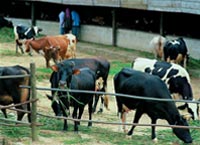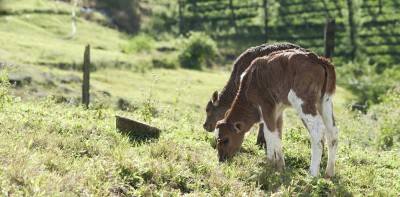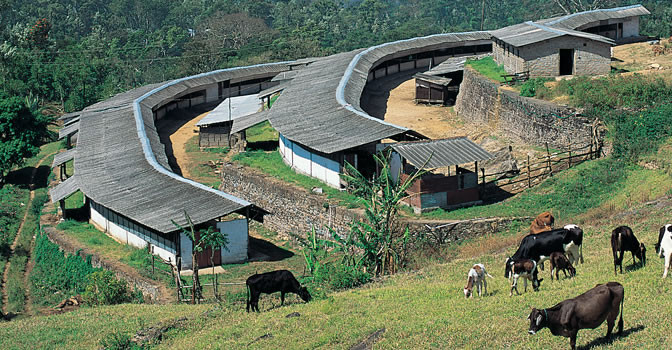Poabs Organic Estates practices biodynamic agriculture, and operates as a self-sustained unit within a closed ecosystem, producing its own compost, seeds and livestock. The estate operates within the larger context of the local community and the rhythms and relationship of nature and the cosmos.
Dr. Rudolf Steiner called the soil an organ of the agricultural body. Maintaining soil fertility and vitality requires compost, made from farmyard manure and plant material, as fertilizer. At Poabs Organic Estates, there are fully integrated systems to produce the compost on site.
 The on-site Composting Yard produces around 3500 Mt of compost annually. Cow dung and all the organic waste materials of the farm are used for composting. Biodynamic composting is also practised.
The on-site Composting Yard produces around 3500 Mt of compost annually. Cow dung and all the organic waste materials of the farm are used for composting. Biodynamic composting is also practised.
All biodynamic “preparations”, coded BD 500 through BD 507, comprising cow manure and herbal formulations are prepared on site.
Prescribed biodynamic activities, related to the preparation of cow horn manure and various other biodynamic preparations, are conducted year-round.
The Poabs estate also maintains a nursery to grow the various herbs such as yarrow, chamomile, stinging nettle, dandelion and valerian, which are used in homeopathic doses as soil conditioners.
Twenty-eight Cow Pat Pits (CPP) have been constructed to prepare CPP regularly, which can meet the requirements of the estate. Liquid manures are also prepared, utilising a variety of local biomass.
 Poabs maintains cows on the estate that supply the essential ingredient for what is known as cow horn manure. In this procedure, the dung of a lactating cow is stuffed into the hollow of cow horns, which are then buried in a pit in early autumn, and taken out in the following spring, by which time the contents have matured into manure rich in humus, resembling forest soil in the high ranges.
Poabs maintains cows on the estate that supply the essential ingredient for what is known as cow horn manure. In this procedure, the dung of a lactating cow is stuffed into the hollow of cow horns, which are then buried in a pit in early autumn, and taken out in the following spring, by which time the contents have matured into manure rich in humus, resembling forest soil in the high ranges.
To promote sustainability, the estate supports a Fish Farm where varieties of fish such as Grass Carp, Rohu, Cyprus etc. are bred. In addition, a Dairy Farm supplies milk to the workers; the cow urine is used for composting and biodynamic activities.
Interactive Training Programmes (ITP) have been organized to impart the philosophy and practices of biodynamic agriculture to supervisors/ executives/managers of the estate. Simple and pragmatic modules have been developed, and the planting calendar has been translated into the local language for easy assimilation.

